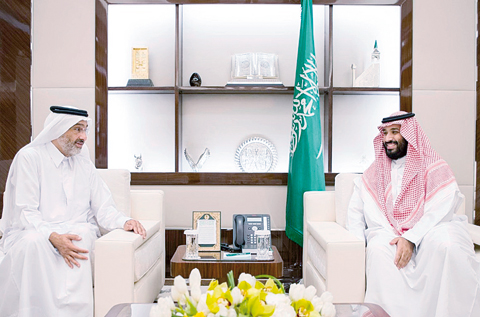Doha cautiously welcomes decision
 JEDDAH: Saudi Crown Prince Mohammed bin Salman (right) meets Qatar's Sheikh Abdullah bin Ali bin Jassim Al-Thani late Wednesday. - AFP
JEDDAH: Saudi Crown Prince Mohammed bin Salman (right) meets Qatar's Sheikh Abdullah bin Ali bin Jassim Al-Thani late Wednesday. - AFPRIYADH: Qatari hajj pilgrims began to enter Saudi Arabia yesterday, Saudi media reported, as Riyadh reopened the border in a move cautiously welcomed by Doha despite a diplomatic row engulfing the region. The Salwa border crossing, a key passage for Muslims on the annual hajj pilgrimage, has been closed since June in a major crisis that saw Riyadh and its regional allies cut relations with Doha over allegations that the emirate supported Islamist extremists.
Qatar has denied the charge and in turn accused Riyadh of politicizing the hajj by restricting its citizens from making the pilgrimage to Makkah, the holiest site in Islam that is located in western Saudi Arabia. Around 120 Qataris entered Saudi territory yesterday through the Salwa border, also known as Abu Samrah, Saudi state television reported, after King Salman called for the border to be opened for pilgrims without electronic permits. He also ordered that private jets belonging to Saudi airlines be sent to Doha airport "to bring all Qatari pilgrims at his expense", state news agency SPA announced.
Qatar welcomed the decision but also lashed out at what it called Riyadh's politicization of religious freedoms. "Regardless of the manner in which pilgrims from Qatar were banned from the pilgrimage, which was politically motivated... the government of Qatar welcomes the decision and will respond positively," Qatari Foreign Minister Mohammed bin Abdulrahman Al-Thani told reporters on a visit to Stockholm. "What matters to us is the bottom line, which is that our citizens now have a way to attend the hajj, and we uphold our demand that hajj be spared politicization."
The hajj, a pillar of Islam that capable Muslims must perform at least once, is to take place this year at the start of September and it is expected to draw around two million Muslims from around the world.
'Right to pilgrimage'
On June 5, Saudi Arabia, Egypt, Bahrain and the United Arab Emirates severed diplomatic and trade ties with Qatar in what has emerged as the worst political crisis to grip the region in decades. The kingdom's decision to reopen the frontier came shortly after its powerful Crown Prince Mohammed bin Salman met Qatari envoy Sheikh Abdullah bin Ali bin Abdullah bin Jassim Al-Thani, a member of Qatar's ruling dynasty.
The meeting on Wednesday in the Saudi Red Sea city of Jeddah was the first public high-level encounter between the nations since the crisis erupted more than two months ago. The Qatari foreign minister, however, said that Sheikh Abdullah had acted on a "personal initiative" and not on behalf of the Doha government. The decision also came after SPA reported that Prince Mohammed had received a phone call from US Secretary of State Rex Tillerson, who has sought repeatedly to defuse the regional crisis.
Sheikh Abdullah, who's lived previously for some years in Saudi Arabia and has gone back on private visits, has no role in government and his last position was as head of the equestrian and camel racing federation in the 1970s and 1980s, said Gerd Nonneman, a professor of International Relations and Gulf Studies at Georgetown University in Qatar. Sheikh Abdullah's grandfather, father and brother were rulers of Qatar until a palace coup ousted his branch of the royal family in 1972.
"He's certainly not an envoy of the Qatari government. This was not a deal that was struck," Nonneman said, describing it as a Saudi "propaganda ploy" to catch the Qatari government off-guard. He said Saudi outreach to various individuals within Qatar's large royal family causes discomfort and "needles the Qatari leadership". Sheikh Abdullah was quoted as telling the Saudi prince that the ties between the two countries "are brotherly relations rooted in history." Saudi Arabia's crown prince responded in kind, emphasizing the historical ties between the two royal families, according to the Saudi Press Agency.
Cautious
Qatar's National Human Rights Committee issued a brief statement yesterday responding to what it said were "reports in Saudi media" outlining the kingdom's measures for Qatari pilgrims. The committee expressed its "satisfaction" with the decisions, but reiterated its demands that the hajj not be politicized and said the Saudi measures remain "unclear", particularly regarding the facilitation of hajj for foreigners residing in Qatar. The statement noted that the agreement does not include allowing Qatar Airways flights carrying pilgrims. The statement also called "for further measures to lift the siege entirely on citizens and residents of Qatar."
Analysts cautioned yesterday that the dispute was far from over. "This is a goodwill gesture towards the Qatari people and not a breakthrough with the Qatari" government, Ali Shihabi of Washington-based think-tank Arabia Foundation said on Twitter, referring to the border reopening.
The decision also drew strong comments on social media, with many Qataris reacting critically. "We do not need the (Saudi) king's charity. The Qatari right to pilgrimage is not given as charity from the king," one Qatari wrote on Twitter. Some Qataris said that even with permission to enter Saudi Arabia they would be concerned for their safety. "I think it is very risky to go to Makkah this year, there could be hate crimes against Qataris," said Fatima Al-Mohannadi, a Qatari student.
A tiny gas-rich emirate with a population of 2.6 million, 80 percent of them foreigners, Qatar ranks as the world's richest country on a per capita basis, according to the International Monetary Fund. - Agencies










